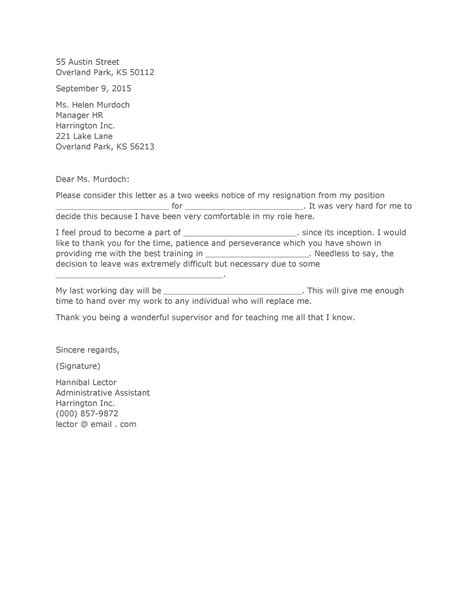Reasons To Avoid Giving Two Weeks' Notice

The Traditional Two Weeks’ Notice
For many years, the standard practice when leaving a job has been to provide your employer with at least two weeks’ notice. This gives the employer time to find a replacement and to make a smooth transition. However, in some situations, giving two weeks’ notice may not be the best option. In this post, we will explore some of the reasons why you may want to avoid giving two weeks’ notice.
Reasons to Avoid Giving Two Weeks’ Notice
1. Fear of Retaliation
Unfortunately, some employers may not react well to an employee’s resignation. They may retaliate by denying accrued benefits, decreasing work hours, or even terminating the employee on the spot. If you fear retaliation from your employer, it may be better to leave without giving two weeks’ notice.
2. Toxic Work Environment
If you work in a toxic work environment, giving two weeks’ notice may not be worth the potential stress and negative impact on your mental health. In this situation, it may be better to prioritize your well-being and leave the job as soon as possible.
3. Concerns About Confidentiality
If you work in a position where you have access to sensitive information, you may be concerned about the confidentiality of that information if you give two weeks’ notice. In this case, it may be better to leave without providing notice to minimize the risk of confidential information being leaked.
4. Lack of Trust in Employer
If you don’t trust your employer to handle your departure professionally, you may not want to give two weeks’ notice. This could be due to previous negative experiences or a general feeling of mistrust. Leaving without giving notice may be the best option in this scenario.
5. New Opportunity
If you have a new job opportunity lined up and need to start as soon as possible, giving two weeks’ notice may not be feasible. In this case, it may be better to prioritize your new opportunity and leave your current job without notice.
6. Personal Reasons
There may be personal reasons why you cannot provide two weeks’ notice. For example, a family emergency may require you to leave your job immediately. In this situation, it’s important to prioritize your personal obligations.
7. Contractual Obligations
If you have a contractual obligation that prevents you from giving two weeks’ notice, you may need to leave your job without notice. It’s important to review your contract carefully and follow the terms outlined.
8. Lack of Benefit
If you are leaving a job where you will not receive any additional benefits for giving two weeks’ notice, such as a payout or positive reference, it may not be worth the effort to provide notice. In this case, leaving without notice may be the easier option.
9. Unfair Treatment
If you feel that you have been unfairly treated by your employer, such as being passed over for promotions or receiving unequal pay, you may not feel obligated to provide two weeks’ notice. In this case, leaving without notice may feel like a form of justice.
10. Company Culture
Some companies have a culture of high turnover or do not value the standard two weeks’ notice. In this case, it may be acceptable to leave without providing notice. However, it’s important to review company policies and culture before making this decision.
FAQs
1. Is it ever appropriate to give less than two weeks’ notice?
Yes, there are circumstances where giving less than two weeks’ notice is acceptable. For example, a family emergency or sudden illness may require you to leave your job immediately. It’s important to prioritize your personal obligations.
2. Can an employer legally withhold benefits if I don’t provide two weeks’ notice?
It depends on the terms of your employment contract and local laws. In general, an employer cannot withhold earned benefits, such as vacation pay or sick leave, but may be able to withhold benefits that were contingent on providing two weeks’ notice.
3. How can I leave my job without burning bridges?
It’s important to be professional and respectful when leaving your job, even if you are not providing two weeks’ notice. You can offer to help with the transition, provide a detailed explanation of your reasons for leaving, and express gratitude for the opportunities you had while working for the company.
